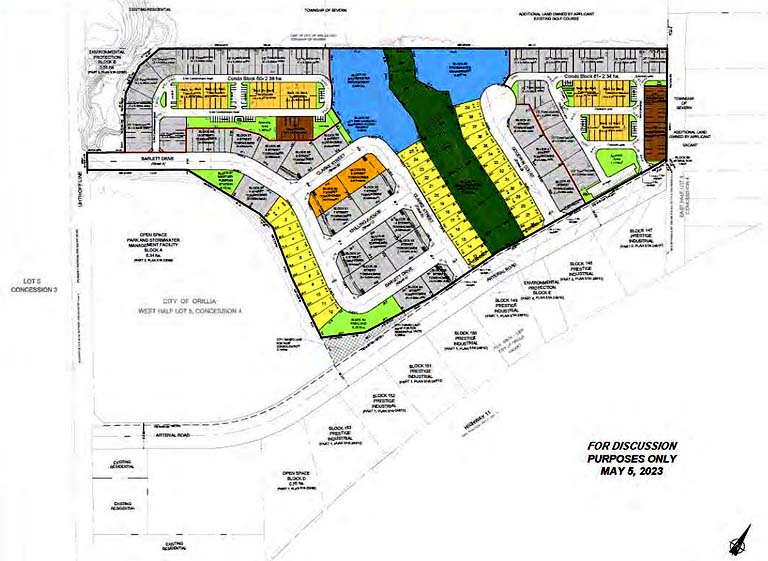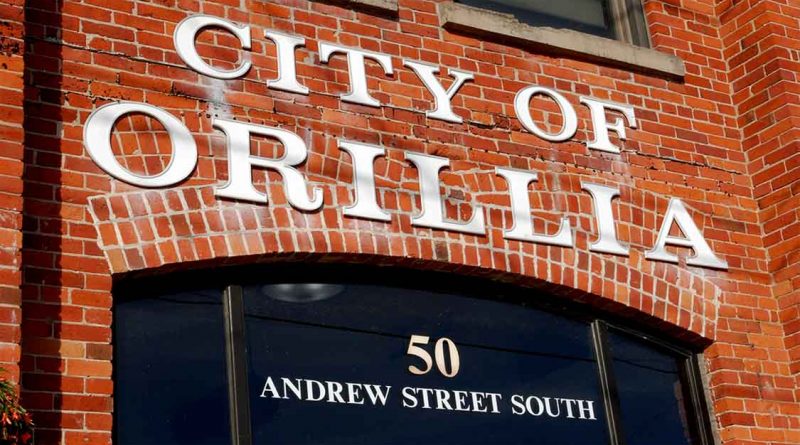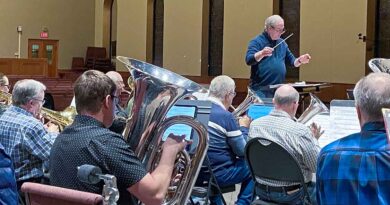Council Preview
By John Swartz
Orillia council has an early 1 p.m. start for it’s July meeting. The reason is to hold a public meeting on planning matters.
Staff has a report about a significant change to the plan to develop the Inch Farm, formally known as 4501 Uhthoff Line.
Liv Communities of Burlington is essentially proposing to throw out the previous draft plan of subdivision and zoning by-law amendment from 1993 which had 123 detached and 46 semi-detached homes. The new plan is for 39 detached hoses, 15 townhouses (with 16 ft. frontage), 107 townhouses (20 ft. frontage) and 190 condos.
The new plan also increase the size of an environmental protected area, and adds more public and private park space.

The process for changing an already approved plan is called Red Lining. Typically, minor changes can be made without a full council and public meeting. A major change like the one in question requires a public meeting.
Additionally, the plan moves the arterial road away from Highway 11 to the opposite side of a number of industrial lots. The number of industrial lots increases from 5 to 8, which will abut Highway 11.
During the 2023 budget meetings council did not approve construction of an arterial road because the tender prices came in over budget. Liv subsequently came up with a plan to construct the road part way into the property, which allows them to start on the first phase, 22 housing units, of construction. Council approved the plan at the June 19 committee meeting.
Committee Meeting
When the planning meeting is over, council will go directly to the committee meeting. First up, because there are no deputations or presentations scheduled, will be the public forum, followed by a closed session. In the closed session the topic is the sale of part of lane plan 573. It’s been observed that there is less and less description of what closed session meetings are about, hence information about where plan 573 is in the City and what lane is in question can’t be stated.
License To Rent
When council returns in public, the first item is one property owners in certain parts of the City, and in many other communities have been following closely. It’s a report about short term rentals (Airbnb’s).
Council asked staff to report on creating a by-law to license and make rules earlier this year, against advice of staff to wait and see what happens with several court cases. This presumably cost a bit of money since Aird Berlis LLP was retained to provide legal advice.
Staff is proposing a by-law require a $2,000 license (plus inspection fee of $100) and regulate those who want to use their properties for short term rentals. Staff also propose a 15 point demerit system to revoke a license (which implies 15 chances to annoy neighbours), and occupancy limits of 2 people per bed (and a maximum 10 people for address, which effectively would stop people from renting and then throwing the doors open for parties).
Staff also want to hire a by-law officer just for this. They also want council to approve $46,000 for software to manage the licensing system and to hire a person full-time beginning October 2. Staff’s recommendation is based on the experience of other municipalities where 1.5 to 3 full-time equivalent positions were needed for administration. The by-law would come into effect January 1, 2024.
So effectively taxpayers are paying a cost of doing business companies like Airbnb should be paying.
Fines for breaking regulations range from $500 the first time, to $1,500 for a third and after. Operating without a license carries a $3,000 fine.
Staff is also proposing only 150 licenses be made available.
Staff estimate a licensing program will cost $197,000, but revenue of $201,000 room license fees and the Municipal Accommodation tax would balance.
Who Is Screaming?
The burning issue of allowing ice cream trucks to operate on City streets is back in front of council for the third time because of an inquiry motion to look into it again.
Staff propose a by-law that would require operators to have a business license, not operate on main roads, or near parks and schools, and operate only during daylight, among other riles. Trucks would be prohibited from operating downtown. Option 2 is to receive as information, which means do nothing.
Next, council asked staff to report on increasing maximum building heights in the downtown core and Orchard Point.
The current official plan and zoning allows for 6, 8 and 12 stories in different parts of the downtown. There is a trigger involved that anything over 4 stories must come to council for zoning amendments.
It’s not as simple as council saying yes, public meetings like any other official plan or zoning amendment application have to be held.
While there are no specific zoning by-laws for any one property at present, staff suggest starting the process for amending the zoning by-law to identify properties where higher construction will be permitted would help with development intensification targets.
What’s In A Name?
Several years ago someone at the City started calling the road/parking lot between Mississaga and Elgin Streets which runs next to Veteran’s Park by the fancy name, The Esplanade. This was confusing to SUNonline/Orillia (and even before) since Google Maps labelled it Lakeview Avenue and Google usually doesn’t pick street names out of the air.
In this report staff confirm an old map shows it being called Lakeview Crescent (more confusion because it certainly is not a crescent).
Now the Army Navy Air Force Club is asking council to rename it Veterans’ Way. Staff’s report recommends doing nothing on the matter. The first reason is because it’s not a street, or road, by any design definition and cannot be officially named as a roadway. This kind of explains the sudden surfacing of the name The Esplanade a few years ago, it could be called anything – unofficially.
Except, the parking lot by-law calls it the Veterans’ Memorial Park Parking Lot. It’s only legal definition is as a parking lot, which just happens to connect two streets. Long term there is a plan to extend Centennial Drive through to Cedar Island Road at which time it will become a road.
Council could, if it chooses based on the information, decide to stop staff from calling it the meaningless and made up Esplanade name and refer to it as Veteran’s Way, either temporarily until Centennial is extended, or permanently similar to how Highway 401 (which is still officially the Macdonald–Cartier Freeway) has a portion of it also called the Highway Of Heroes.. That way everyone goes home happy, except for whomever arbitrarily decided to use The Esplanade.
Development Charge Reserve Statement
The 2022 year-end report of the City’s development charge reserve is on the agenda. It’s been in a negative balance for many years but the previous two council’s made great efforts to get closer to a positive balance. At year end 2021 it stood at $9.7 million in the red.
Here’s the difference between this reserve and other reserves the City maintains. The DC account is theoretically funded by developers, while all the others come from mostly property taxes, or fees charged, or proceeds of land sales.
At the 2022 year end the balance was $24.3 million in the red. Two things contributed, charges levied went down to $1.4 million (from an annual average of $3.6 million since 2018), and funding from two projects the Gill Street fire hall and part of the rec centre costs were eligible for be considered as growth related. Expenditure on these two projects from other accounts was shifted to the DC account.
Development charges are intended to be used to increase municipal services necessitated by growth, and therefore not paid for by existing taxpayers.
In the interesting and pedantic world of accounting, even though the City has positive balances ($79 million) in several accounts and could wipe out the DC deficit tomorrow (just the 2022 contribution to all reserves was $17.8 million), allocating funding for projects from the DC account constitutes borrowing and the City has to pay interest to itself for that changing of money from one pocket to another. The City paid $505,770 interest on the deficit in 2022, which is almost equivalent of 1% of your tax levy, even though they did not take out an institutional loan.
Staff advise projections of DC income show the balance should be in the black by 2030. However, complicating matters is the province’s wonderful Bill 23, which changes how DCs are charged and what the money can be used for. Staff have estimates based on what they know, but the province still hasn’t completed regulations, so things could change.
The treasury department also has a report on the City’s 2022 year end. Even though some departments over spent their budget, in general the operating budget was under spent by $2.6 million.
The largest case of over spending was recreation. Because of COVID, revenue was $663,069 short of budget. COVID also was a significant contributor to over spending with transit and lower revenue for legislative services.
On the positive side the City saved $522,000 with lower energy costs because of the LED street lighting program and upgrades to both major recreation facilities.
The City had 336 capital projects in 2022 with 91 one of them completed without spending all the budgeted amounts. A total of $6.2 million was credited back to the reserve accounts spending was designated to pay for the projects.
Only 15 projects had overruns amounting to $111,000 additional spending, which in comparison to many other communities is exceptional.
Still with capital, the report also lists 15 projects that have rather small overages for council approval in the total amount of $51,241.40. Council will also be cancelling 7 capital projects that for various reasons will not be happening. One of those, a Huronia Cultural Campus feasibility study ($150,000) is removed because, “The initially planned use for the site is no longer viable.” Whether this is because the group advocating for a cultural use of the land is dormant, or the province once again changed its mind on the property and just hasn’t informed the community is not indicated.
Motions
Councillor Lauer has a reconsideration motion regarding the recently adopted report, Strategic/Corporate Plan Process. That report carried with it an $80,000 expenditure for consultants. Lauer is objecting to spending the money because council already formulated its objectives and there already is a strategic plan council could review and adapt without expense. Lauer wants to change the original motion from taking action to receiving the report (take no action).
Under by-laws, there is one to tax Georgian College, Lakehead, and Soldiers’. Under the municipal act schools and hospitals can’t be charge property taxes, but they can be tax in other ways. In these cases a head tax based on enrollment for the schools (Georgian, 2022 enrollment 1,071 = $80,325; Lakehead 1,597 = $119,775) and the number of beds at Soldiers (246 = $18,450) are the measures used.
The meetings can be watched live on the City’s Youtube channel.
(Photos by Swartz – SUNonline/Orillia; Images Supplied)




